The Great Gatsby Blu-ray Movie
HomeThe Great Gatsby Blu-ray Movie 
Warner Bros. | 1974 | 144 min | Rated PG | Apr 23, 2013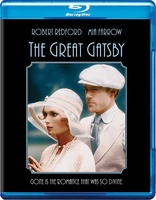
Movie rating
6.1 | / 10 |
Blu-ray rating
| Users | 0.0 | |
| Reviewer | 2.5 | |
| Overall | 2.5 |
Overview
The Great Gatsby (1974)
Nick Carraway, a young Midwesterner now living on Long Island, finds himself fascinated by the mysterious past and lavish lifestyle of his neighbor, the nouveau riche Jay Gatsby. He is drawn into Gatsby's circle, becoming a witness to obsession and tragedy.
Starring: Robert Redford, Mia Farrow, Bruce Dern, Karen Black (I), Scott WilsonDirector: Jack Clayton
| Romance | Uncertain |
| Drama | Uncertain |
| Period | Uncertain |
| Melodrama | Uncertain |
Specifications
Video
Video codec: MPEG-4 AVC
Video resolution: 1080p
Aspect ratio: 1.78:1
Original aspect ratio: 1.85:1
Audio
English: DTS-HD Master Audio 5.1
Spanish: Dolby Digital Mono
Subtitles
English SDH, French, Spanish
Discs
50GB Blu-ray Disc
Single disc (1 BD)
Playback
Region free
Review
Rating summary
| Movie | 2.0 | |
| Video | 4.0 | |
| Audio | 4.0 | |
| Extras | 0.0 | |
| Overall | 2.5 |
The Great Gatsby Blu-ray Movie Review
Would you believe The Middling Gatsby?
Reviewed by Jeffrey Kauffman April 24, 2013Will five be the charm for The Great Gatsby? F. Scott Fitzgerald’s immortal story, which is regularly placed atop any list of the supposed “Great American Novel”, has had four (large and small) screen adaptations through the years, and is about to experience its fifth with the high profile Baz Luhrmann adaptation which is set to open momentarily. Few are probably that familiar with the first adaptation, a 1926 silent starring Warner Baxter and and Lois Wilson, which is considered a “lost film”. In 1949 Paramount put out a fatally miscast version, with Alan Ladd (replacing Tyrone Power, who arguably would have been better) as Jay Gatsby and Betty Field as Daisy Buchanan. Seemingly divorced from Fitzgerald’s vaunted Jazz Age timeframe and retaining little of the novel’s doleful flavor, this Gatsby was a big, glossy ultra-Hollywood entertainment that was kind of like experiencing Fitzgerald through a prophylactic. The film industry was certainly a different animal some twenty-five years later, when Paramount again decided to tackle The Great Gatsby, after a long gestational period that had actually begun several years previously when Paramount’s then head honcho Robert Evans optioned the rights to the book as a starring vehicle for his then wife Ali MacGraw. A number of different stars came and went in the intervening years, but things seemed to be significantly better cast, at least on paper, when Robert Redford and Mia Farrow were finally announced as the leads. While eyebrows may have been raised by the writing credit afforded to Francis Ford Coppola (as well as allegedly early uncredited work by Truman Capote), cynics’ tongues may have simultaneously been wagging over the producing credit, the legendary (and legendarily difficult) Broadway impresario David Merrick. Merrick had one of the most lustrous producing careers in the entire history of The Great White Way (flops like his infamously disastrous musicalization of Breakfast at Tiffany’s notwithstanding), but as a film producer he was never able to recapture that stage magic. In 1972 he had produced the film version of one of his recent stage successes, the interesting psychological thriller Child's Play, but Merrick probably had neither the experience nor the expertise to really adequately manage a production as large as The Great Gatsby promised to be. Merrick did have the public relations hubris to make his Gatsby one of the most publicized films of its year, with tons of cover stories on various magazines (including one of the first issues of the then-new People). And while it’s certainly arguable that the 1974 version of The Great Gatsby is much more faithful (some might even say reverent) to the tone and substance of Fitzgerald’s original work, the film is often listless and uninvolving, and for all its splendor is often like experiencing Fitzgerald through two prophylactics.
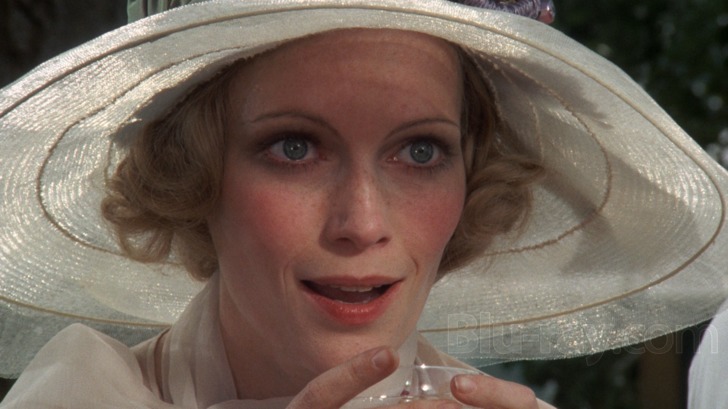
It was F. Scott Fitzgerald’s great achievement in The Great Gatsby that he was able to craft what on its surface seems like a story of unrequited love, but which is in fact a rather scathing assessment of an entire era. Most people probably know the broad outlines of the novel. Jay Gatsby (Robert Redford) is a mysterious millionaire whose Long Island parties in the early 1920s are legend, as in fact are stories about his perhaps criminal ties which helped him to achieve his millions. Gatsby is an elusive, enigmatic individual whom no one really seems to know, which becomes ironic when Nick Carraway (Sam Waterston), the character who narrates Fitzgerald’s novel and this film, finally gets invited to one of Gatsby’s parties and it turns out the two served together in World War I. Nick’s second cousin Daisy Buchanan (Mia Farrow) also lives on Long Island and is married to a brute named Tom (Bruce Dern), a man who comes from “old money” but has few social graces to match his wealth. Tom is involved in a tempestuous affair with Myrtle Wilson (Karen Black), something that he doesn’t work very hard to keep hidden from Daisy. As the story progresses, it turns out that Gatsby and Daisy have a history together and that in fact Gatsby’s arrival in Long Island is no mere coincidence, and his goal is to rekindle their long ago romance.
This hopelessly brief précis only barely scratches the surface of the story’s convoluted plot and in fact leaves out at least two major supporting characters (Myrtle's hapless husband George and Nick's kind of girlfriend Jordan), but it provides enough context to get to one of Fitzgerald’s major points in his piece: no one is exactly who they seem to be. While all of the major characters have their own identity issues, none is more obvious than Gatsby himself, a man who has literally remade himself in order to recapture a lost love. There’s an unstated desperation about Gatsby which Redford deals with in an understated manner, one which plays relatively well against some of the more florid representations of Black as Myrtle and Dern as Tom. But Redord really provides little interior life to this iconic cipher, making that desperation seem uninvolving and even mundane. And while Farrow has a certain patrician grace as Daisy, there’s a waifish quality to her portrayal that becomes slightly annoying after awhile, especially since Daisy's marriage is such a rocky relationship. There’s also a rather surprising lack of romantic chemistry between the two stars, something that is pretty fatal to a story about a tragic love affair.
With a certain vacuity at the center of the film, that leaves things like the supporting performances, production design and other technical aspects to pick up the slack, and it’s here that this Gatsby does quite nicely. As vapid as the central Jay-Daisy relationship is at times, there’s a real visceral intensity to the performances of Black and Dern, and Waterston brings his quiet intelligence to the most “decent” of all the characters in the film. The production design of the film is virtually flawless, with Oscar winning costumes by longtime Broadway designer Theoni V. Aldredge which perfectly recreate their era (even if they failed to create a “fashion rage” despite Merrick’s nonstop publicity to make the “Gatsby look” the new haute couture in 1974). Nelson Riddle won the film’s only other Oscar for his adaptation score, one which frankly might have been a “career award” to an iconic figure. But Riddle's contributions are quite lovely, nicely interweaving vintage source cues (including some gorgeously orchestrated versions of "What'll I Do?") with some original underscore.
In a way, though, the film’s emphasis on looks rather than substance is at its core one of the most salient points that Fitzgerald himself sought to make. The Great Gatsby is a story of assimiliation, some artful, some hopeful, but mostly misguided (as evidenced by Nick’s decisions at the end of the novel if not the film), but all of which is geared toward appearances, not necessarily any inherent truth or reality. The plot’s tip towards melodrama in its final act has always struck some literary critics as perhaps the weakest element of the story, but it only serves to point out the shallowness of some of the characters. In fact, when one major character finally finds his true depth, he literally finds himself in over his head.
The Great Gatsby Blu-ray Movie, Video Quality 

The Great Gatsby is presented on Blu-ray with an AVC encoded 1080p transfer in 1.78:1. Director Jack Clayton and cinematographer Douglas Slocombe favor a lot of diffuse light and even occasional soft focus lenses throughout this film, which some may mistake for a so-called "soft" looking transfer. This is actually a lustrously beautiful high definition presentation that very ably recreates the original film appearance. Grain is still very much in evidence, and fine detail is abundant, helped immeasurably by Clayton's favoring of extreme close-ups throughout the film. Colors are very accurate looking (it's such a pleasure to watch a film that hasn't been color graded to within an inch of its life) and very well saturated. There are some very minor stability issues which are almost not worth mentioning on fast passing patterns like car grilles.
The Great Gatsby Blu-ray Movie, Audio Quality 
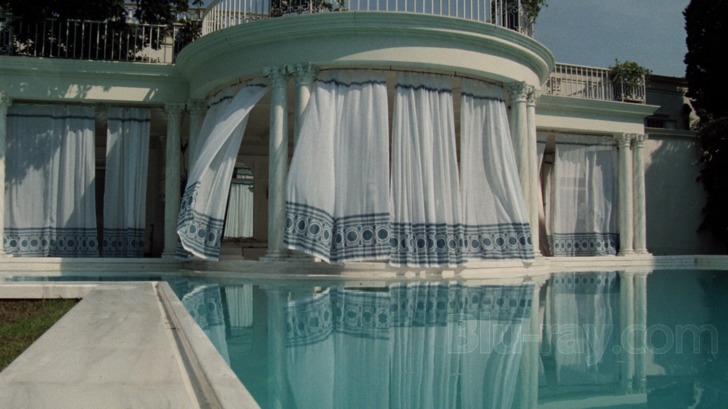
The Great Gatsby features a lossless DTS-HD Master Audio 5.1 mix that doesn't over aggressively repurpose things for a surround mix, and in fact plays things relatively conservatively. I was in fact kind of surprised in the opening credits how the "ghost music" was anchored in the front channels rather than being discretely splayed through the surrounds. Later, however, in the first of the big party scenes, Riddle's source cues are clearly pumping out of the rear channels while the party sounds emanate from the front and side channels, giving a nice sense of aural depth. Dialogue is almost always front and center, but is clear and easy to hear and uniformly well prioritized in the mix. Fidelity is excellent and dynamic range has a few spikes in the more crowded sequences.
The Great Gatsby Blu-ray Movie, Special Features and Extras 
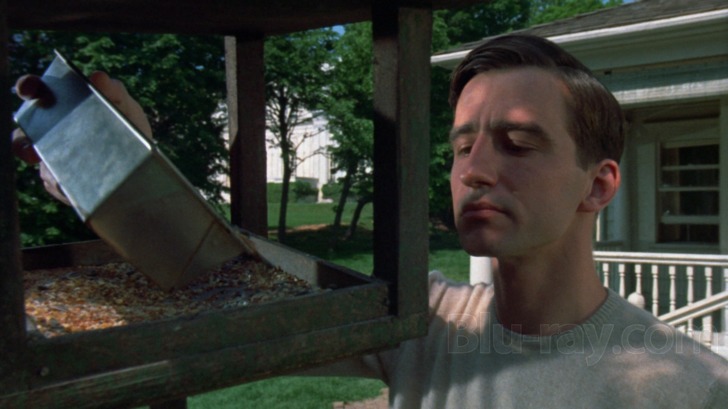
No supplements are offered on this Blu-ray disc.
The Great Gatsby Blu-ray Movie, Overall Score and Recommendation 
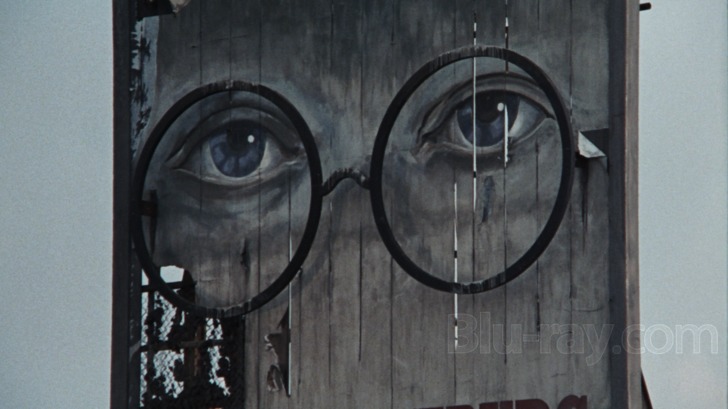
Fitzgerald cloaked his social criticism in the story of a handful of desperate characters on Long Island one fetid summer in the early 1920s, but he indicted the entire Jazz Age for its indolence and self absorption at the same time. Perhaps none too ironically, this film adaptation is equally indolent and self absorbed, lacking any real dramatic momentum (the film is at least a half hour too long, perhaps even more than that) and ultimately being a pretty bauble that is fairly empty at its center. Jack Clayton has an impeccable eye for place and time, but he's lost at sea when it comes to pacing. It's going to be interesting to see what the always colorful Luhrmann does with this material. One thing's for sure, it's pretty much guaranteed to have more energy than this lumbering albeit beautiful dinosaur.
Similar titles
Similar titles you might also like

Downton Abbey: The Complete Series
2010-2015

The Great Gatsby
2013

Water for Elephants
2011

The Painted Veil
2006

Anna Karenina
2012

Seven Pounds
2008

Madame Bovary
2014

Brokeback Mountain 4K
2005

Ophelia
2018

The Light Between Oceans
2016

The Hunchback of Notre Dame
1939

Wuthering Heights
1939

Far from the Madding Crowd
Warner Archive Collection
1967

Downton Abbey: The Motion Picture 4K
2019

Revolutionary Road
2008

The Man in the Moon
1991

Shakespeare in Love
1998

Monster's Ball
2001

Brooklyn
2015

Memoirs of a Geisha
2005
